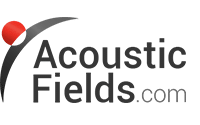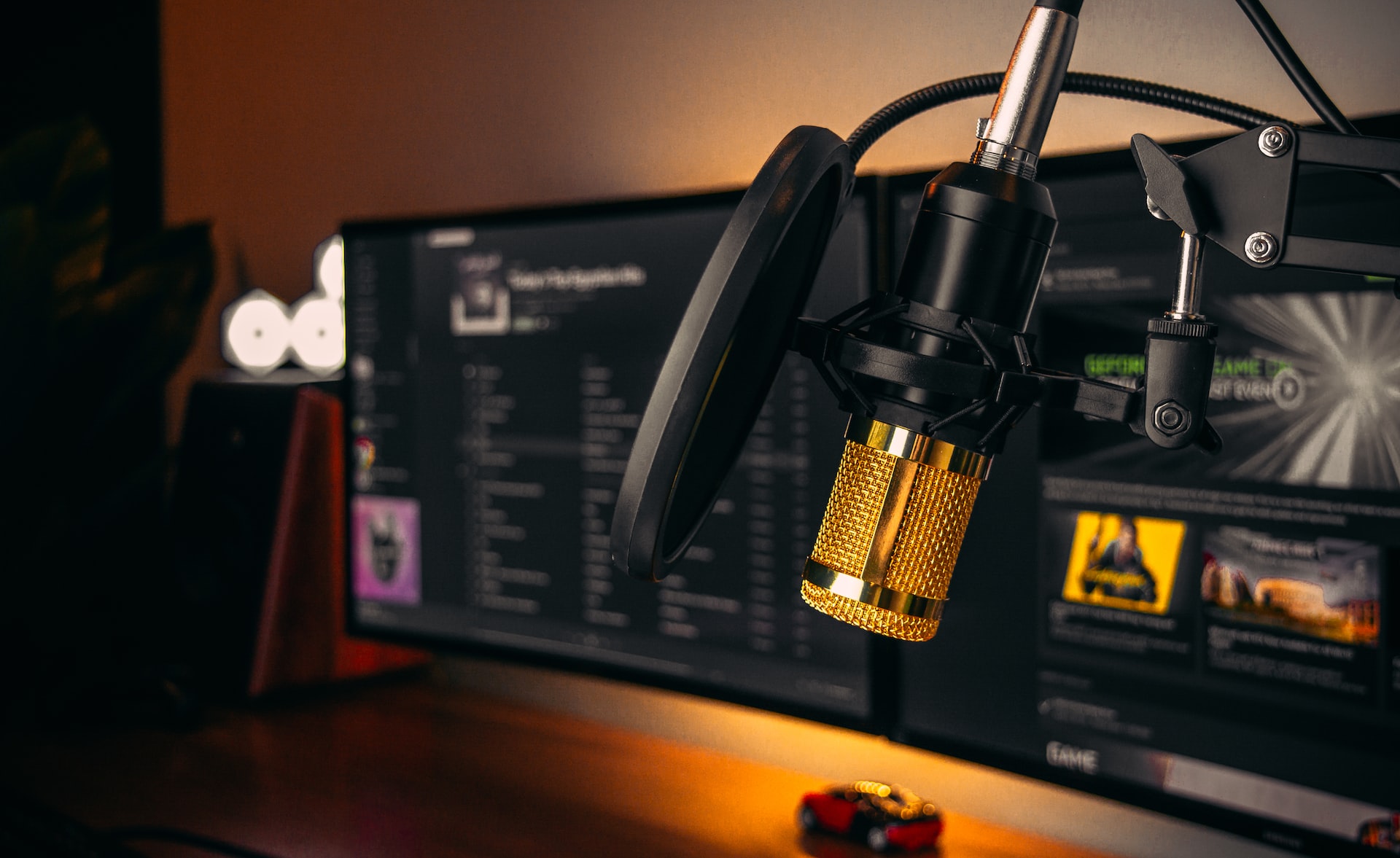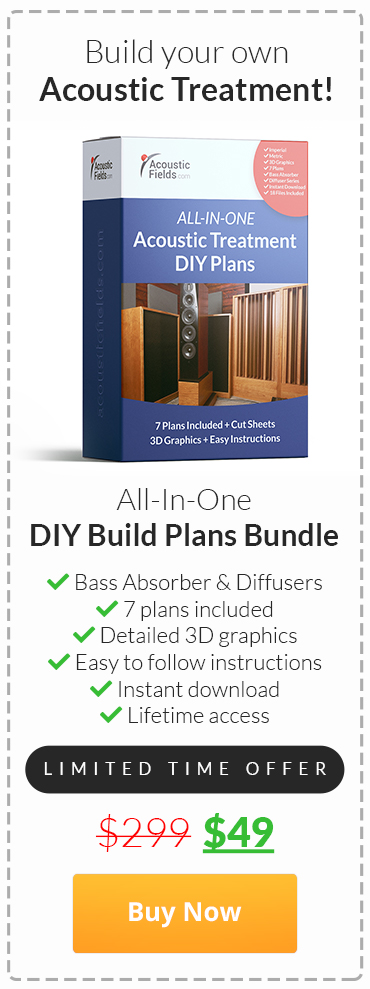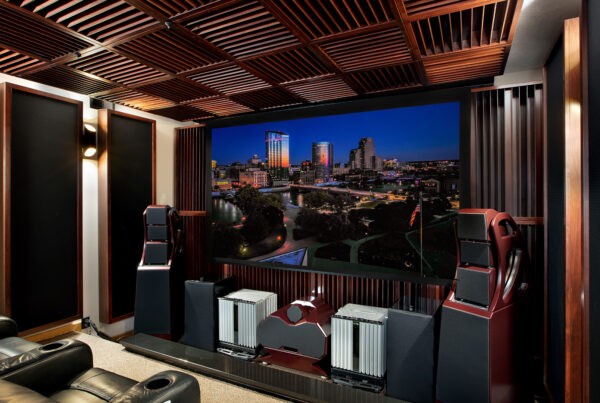Introduction
This article provides a comprehensive guide to some of the best podcasting microphones suitable for podcasters of all levels, including the best podcast microphone for beginners, the best budget podcasting microphone, and the best podcasting microphone for professional podcasters. In recent years, podcasting has emerged as a popular medium for sharing ideas, telling stories, and building communities. With numerous podcasting microphones available in the market, choosing the right one for your specific needs can be a daunting task.
Whether you are a seasoned podcaster looking to upgrade your gear or a novice starting out, this guide will help you make an informed decision. By the end of this article, you will have the necessary knowledge to select the perfect microphone that will take your podcast to the next level.
Table of Contents
First Things First: What Makes A Great Podcasting Microphone?
When it comes to podcasting, having a great podcasting microphone is essential. The quality of your audio is just as important as the content of your show, which is why choosing the right podcasting microphone is crucial for a great podcasting experience. A great podcasting microphone should have a few key features that guarantee its quality.
First and foremost, it should have excellent sound quality, with minimal background noise and clear, crisp audio. It should also have a directional pickup pattern, such as cardioid or supercardioid, to ensure that it captures your voice while minimizing any unwanted ambient noise. Additionally, it should be easy to set up and use, and ideally, be compatible with a variety of recording setups. Last but not least, it should be durable and reliable, as you’ll likely be using it for long periods of time.
So when selecting a great podcasting microphone, it’s all about finding the right balance between quality, convenience, and affordability. Look no further as this article provides the best podcasting microphones to help you make an informed decision.
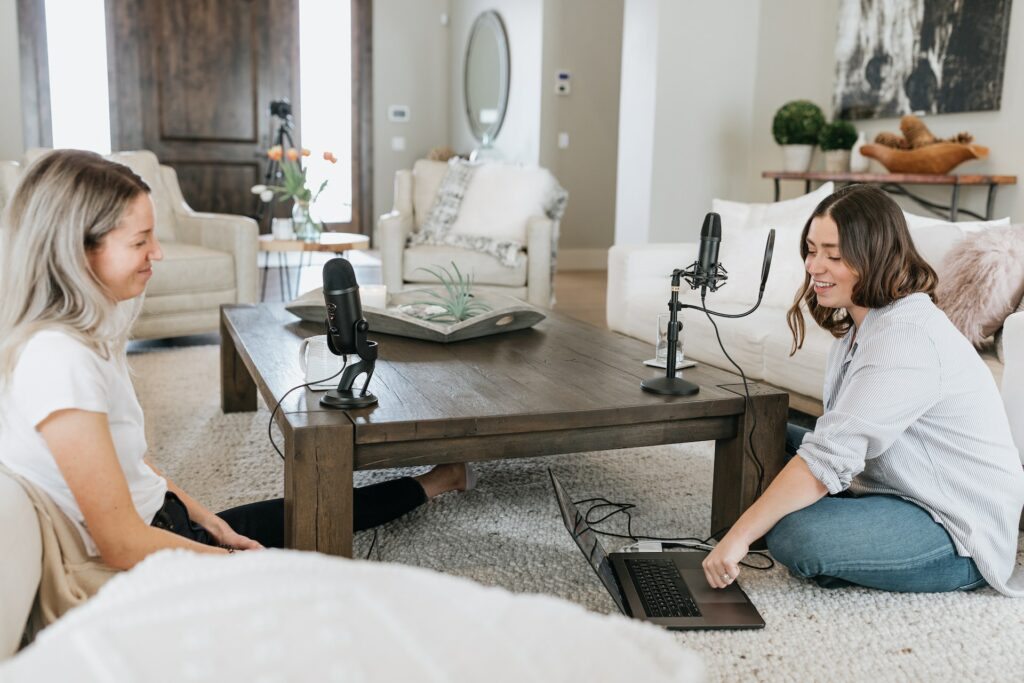
USB VS XLR Microphones for Podcasters
Before we start discussing the best podcasting microphones, let’s highlight the advantages of using a USB microphone over an XLR microphone for this specific purpose. USB microphones are plug-and-play devices, making them incredibly easy to use without requiring any additional equipment such as an audio interface. This makes them a more affordable option, especially for beginners who want to start a podcast without investing in expensive gear.
USB microphones also come equipped with built-in preamps and converters that produce high-quality sound with minimal background noise. USB microphones are also more portable and convenient to use, especially for podcasters recording on-the-go or in different locations. Hence, this article will only feature the best podcasting microphones with USB connectors.
Best Budget Podcasting Microphones for Beginners
If you’re just starting out with podcasting, you might not want to break the bank on expensive recording equipment. Luckily, there are plenty of budget-friendly options that can still deliver quality sound for your podcast. In this section, we’ll explore two of the best podcasting microphones for beginners. These microphones are starting from $39, making them an affordable option for those on a tight budget.
#7: Audiopro usb microphone
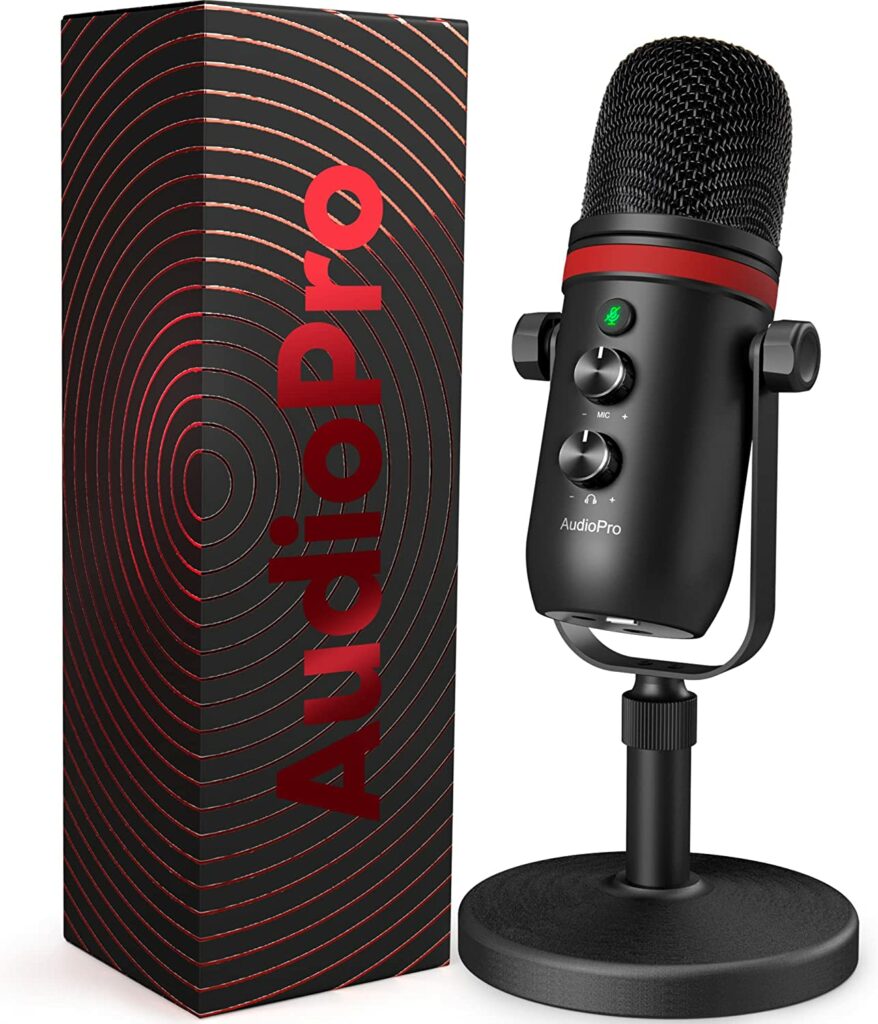
The Audiopro USB condenser microphone is an excellent choice for beginners. One of the main advantages of this podcast microphone is its plug-and-play design, which means that it can be easily connected to any computer or laptop without requiring additional software or drivers. Another benefit of this microphone is its clear and accurate sound quality, which is essential for beginners who want to produce high-quality audio for podcasts, streaming, and other audio recordings.
Additionally, the microphone comes with a headphone jack, which allows users to monitor their audio in real-time and make adjustments as needed. This microphone is a great investment for anyone who wants to start their journey in the world of audio recording and streaming.
Price: $39
#6: Rode NT-USB Mini microphone
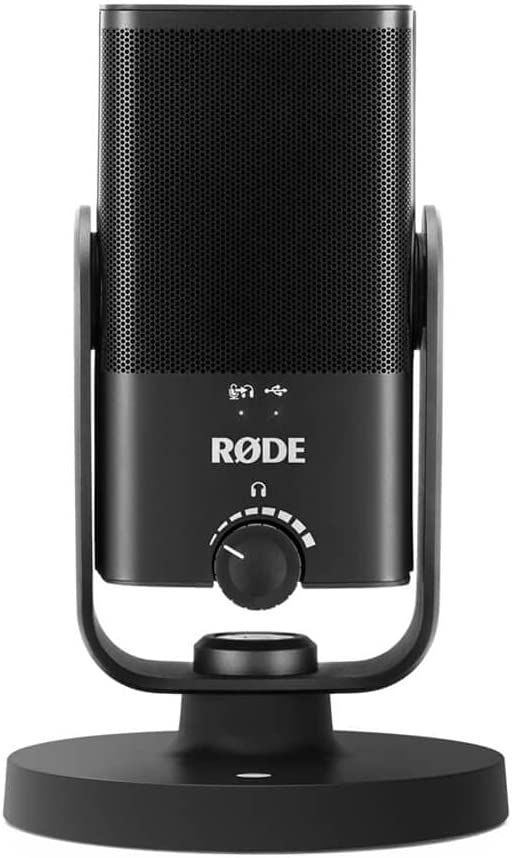
The Rode NT-USB Mini podcast microphone is an excellent choice for beginners due to its compact design and exceptional audio quality. Despite its small size, the microphone features a directional cardioid polar pattern that effectively captures sound directly in front of it, minimizing unwanted background noise. The microphone has a built-in pop shield that helps to reduce plosives and a built-in shock mount that minimizes vibrations from the desk or stand. The microphone also features a headphone jack with volume control that allows for real-time monitoring of recordings.
The Rode NT-USB Mini microphone is compatible with both Mac and Windows computers and is easy to set up and use straight out of the box. With its exceptional sound quality and compact design, this microphone is a great option for beginner podcasters.
Price: $98
Best Podcasting Microphones for Beginners and Advanced Users
If you’ve been podcasting for a while and are ready to upgrade your equipment (or if you’re a more advanced user looking for a step up from entry-level microphones), this section is for you. We’ll take a look at three of the best podcasting microphones that are suitable for both beginners and more experienced users. These microphones are priced between $100 and $200, making them a great investment for those who are serious about producing high-quality podcasts.
#5: Mackie EM-Chromium USB microphone
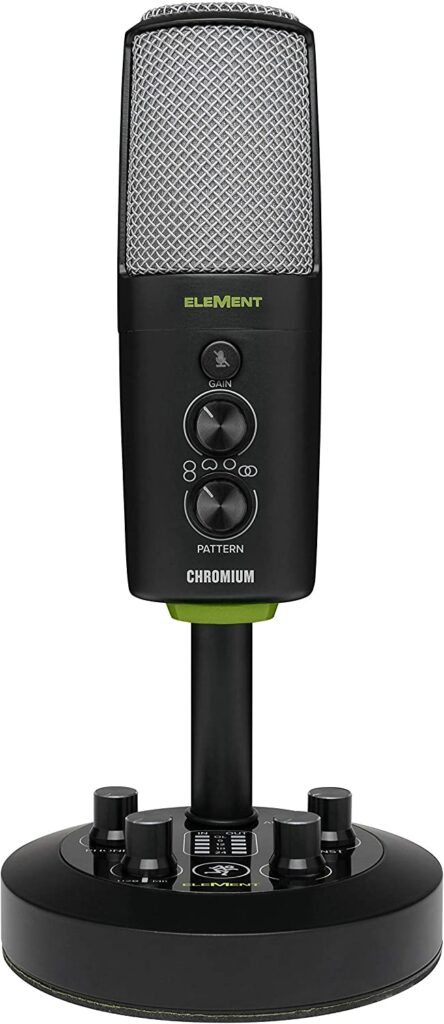
The Mackie EM-91C Condenser Microphone is a versatile and high-performance microphone that is suitable for both beginner and experienced podcasters. This microphone features a cardioid polar pattern that captures sound from the front while rejecting noise from the sides and rear. The microphone’s condenser capsule provides a wide frequency response and high sensitivity, resulting in crisp and clear recordings. The microphone also has a high-pass filter and a -10dB pad switch that allow for greater control over recording quality.
The Mackie EM-91C comes with a shock mount and a desktop tripod stand, making it easy to set up and use straight out of the box. With its durable construction, exceptional sound quality, and versatile features, this microphone is a great investment for those who want to take their podcasting to the next level.
Price: $149
#4 Elgato Wave:3 USB microphone
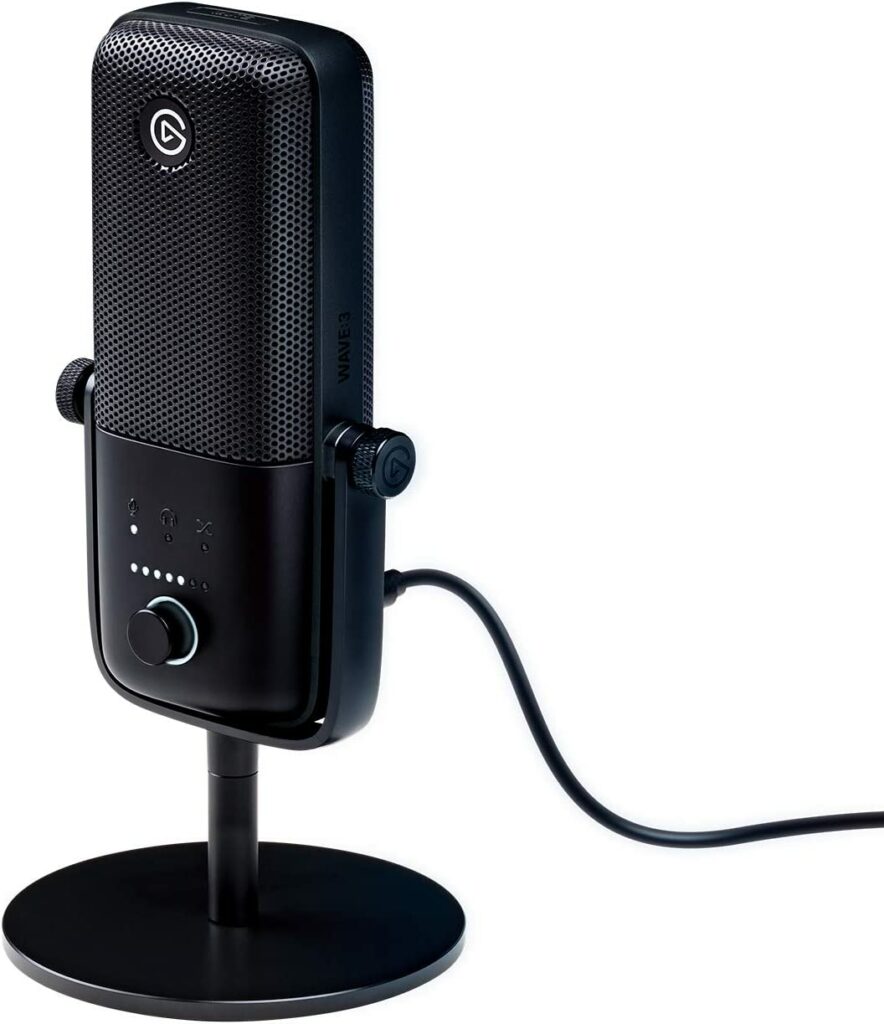
The Elgato Wave microphone is an excellent option for both intermediate users. Its advanced features, such as capacitive touch mute and volume controls, make it incredibly easy to use, while its professional-grade condenser capsule and 24-bit/96kHz audio resolution deliver exceptional sound quality. Additionally, the microphone’s plug-and-play design and compatibility with a wide range of recording software make it a versatile option that can adapt to various recording needs.
With its sleek and modern design, the Elgato Wave microphone is a great choice for anyone looking for a high-quality and user-friendly microphone.
Price: $149
#3: Rode NT-USB microphone
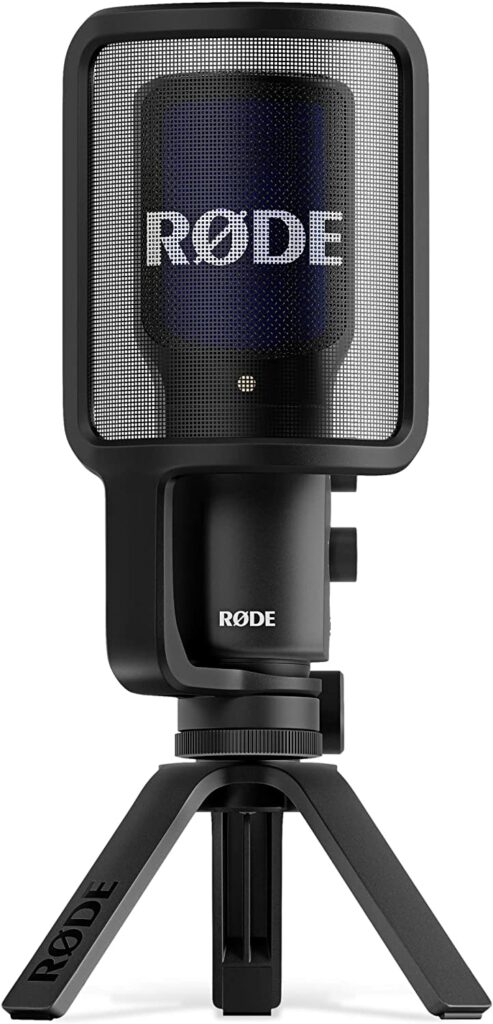
The Rode NT-USB Condenser Microphone is the big brother of the NT Mini – It is a high-quality option for intermediate podcasters who are looking for a professional-grade microphone. This microphone features a cardioid polar pattern that captures sound directly in front while minimizing background noise, resulting in clean and clear recordings. The microphone has a built-in pop shield that helps to reduce plosives, and a 3.5mm stereo headphone jack that allows for real-time monitoring. The microphone is also equipped with a high-quality analog-to-digital converter that provides a frequency response of up to 20kHz, ensuring that all details of the audio are captured accurately.
The Rode NT-USB comes with a desk stand, a pop shield, and a storage pouch, making it easy to set up and transport. Whether you’re a beginner or an experienced podcaster, this microphone is a great investment that will provide professional-grade sound quality for your recordings.
Price: $169
Best Podcasting Microphones for Experts
For advanced and expert podcasters, having the right microphone is crucial to achieving the highest level of sound quality possible. In this section, we will explore two of the best microphones on the market for podcasters who demand exceptional audio performance. These microphones come with advanced features and cutting-edge technology that allow for precise and detailed sound capture, making them a must-have for professional podcasters who want to deliver the best possible content to their audiences.
While they come with a higher price tag than some other options, their exceptional sound quality and advanced features make them worth the investment for those who demand the very best in audio performance.
#2: Apogee HypeMiC USB microphone
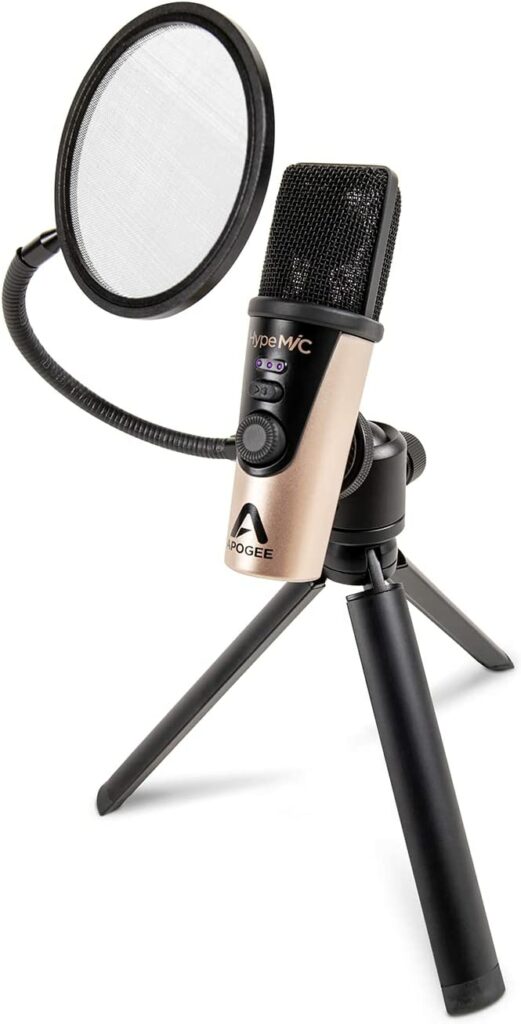
The Apogee HypeMiC is a top-of-the-line microphone that is designed specifically for advanced podcasters who demand the highest level of sound quality. This microphone features a unique blend of analog compression and digital processing that delivers warm, rich, and detailed sound, making it perfect for voice recording, instrument recording, and more.
The microphone has a cardioid polar pattern that captures sound directly in front while minimizing background noise, resulting in clean and clear recordings. Additionally, the HypeMiC has built-in compression and EQ controls that allow for further control over the sound quality, ensuring that the recordings are precisely tailored to the user’s preferences.
The microphone is also compatible with both Mac and Windows operating systems, making it easy to integrate with existing setups. With its exceptional sound quality and advanced features, the Apogee HypeMiC is the perfect choice for advanced podcasters who demand the very best in audio performance.
Price: $333
#1: Antelope Edge Go USB microphone
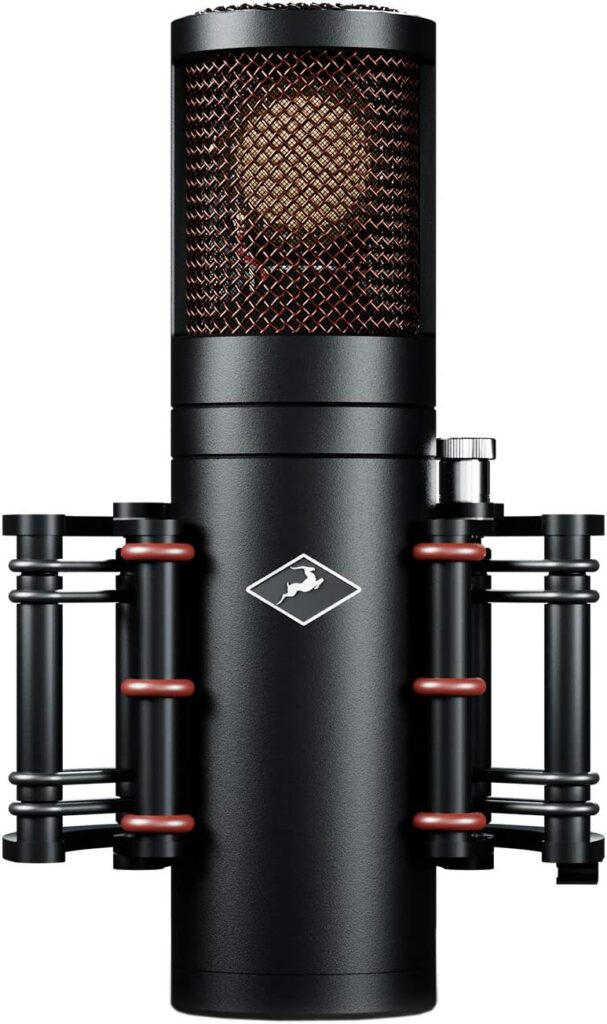
The Antelope Edge Go is a state of the art premium quality microphone that is designed for expert podcasters who demand exceptional audio performance. This microphone features a large-diaphragm condenser capsule that captures sound with incredible detail and precision, ensuring that every nuance of the user’s voice is captured in stunning clarity (this makes it a great candidate for incredibly detailed ASMR recordings).
The Edge Go also features built-in mic emulation technology, which allows the user to emulate the sound of classic microphones from the 20th century, adding a vintage touch to recordings. The microphone has a cardioid polar pattern that isolates sound sources directly in front of the mic while rejecting unwanted noise from the sides and rear, resulting in a clean and focused recording.
The Edge Go is also equipped with a USB-C connector, making it easy to connect to any computer or mobile device for instant recording capabilities. With its advanced features and exceptional sound quality, the Antelope Edge Go is the perfect choice for expert podcasters who demand the very best in audio performance.
Price: $1,395
Our Choice
We would recommend the Rode NT-USB Microphone as the best overall microphone for podcasters. This microphone is suitable for both beginner and intermediate users, with a cardioid polar pattern that captures sound directly in front while minimizing background noise. It has a built-in pop shield that helps to reduce plosives, and a 3.5mm stereo headphone jack that allows for real-time monitoring. Also, the microphone is equipped with a high-quality analog-to-digital converter that provides a frequency response of up to 20kHz, ensuring that all details of the audio are captured accurately.
In our opinion, the Rode NT-USB Microphone provides exceptional sound quality and features that are essential for podcasters, making it a great investment for those who are serious about producing high-quality podcasts.
Summary
Selecting the right microphone for your podcast can be a daunting task, but this guide has provided you with a comprehensive list of some of the best podcasting microphones suitable for podcasters of all levels. From budget-friendly options to premium-quality microphones, this guide has covered it all. Whether you’re a beginner starting out or an experienced podcaster looking to upgrade your equipment, these microphones will help take your podcast to the next level. By investing in the right microphone, you can ensure that your listeners are getting the best possible audio quality and overall listening experience.
FAQ’s
What type of microphone is best for podcasting?
Answer: The best type of microphone for podcasting is a dynamic microphone, as it is better at blocking out background noise and capturing clear vocals.
How much should I spend on a podcasting microphone?
Answer: The amount you should spend on a podcasting microphone depends on your budget and needs. There are good quality microphones available for as low as $50, but investing in a higher-end microphone can greatly improve the sound quality of your podcast. Plan to spend at least $100 on a quality podcasting microphone.
Do I need a pop filter for my podcasting microphone?
Answer: It’s recommended to use a pop filter with your podcasting microphone to prevent harsh “p” and “s” sounds from causing distortion in your recording. Pop filters are affordable and easy to attach to your microphone.
Can I use a USB microphone for podcasting?
Answer: Yes, USB microphones can be used for podcasting. However, they may not provide the same level of sound quality as XLR microphones, which are often used by professional podcasters. It’s important to choose a USB microphone that has good reviews and is compatible with your recording setup.
How far away should I be from my podcasting microphone?
Answer: The optimal distance between you and your podcasting microphone depends on the type of microphone you are using. For dynamic microphones, you should be about 6-12 inches away from the microphone to capture clear vocals. For condenser microphones, you should be about 8-12 inches away to prevent distortion.
Disclaimer
Please note that some of the links in this article may be affiliate links, which means we may earn a commission if you click through and make a purchase. This is at no additional cost to you, and it helps to support our blog and the content we provide. We only recommend products that we believe will be useful and valuable to our readers, and we appreciate your support in helping us to continue creating helpful content.
